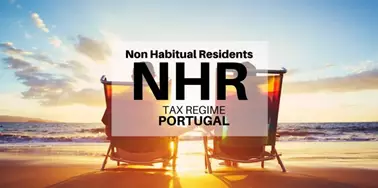The State Budget Law Proposal for 2024 proposes the end of the Non-Habitual Resident regime (NHR)
Further to the announcement last Monday 2nd October 2023 regarding the State Budget Law Proposal for 2024 proposes the end of the (NHR) Non-Habitual Resident regime and foresees a new tax incentive for scientific research and innovation.
The Budget is still in draft form and therefore nothing has changed for now. There will be a period of voting and discussions on the whole Draft Budget. But although the decision is not yet official, it is expected that the NHR status will no longer be granted as of January 2024, as part of the new State Budget, with effect from January 1, 2024. However, according to the Draft, the NHR will continue to be applicable on the following situations:
Any current beneficiaries of the program will remain unchanged for the remainder of the 10-year period.
And anyone who still manages to register as NHR until its termination, (31st December 2023), as well as holders of a valid residence visa issued until the 31st of December 2023, will maintain all the benefits with the exact same features.
This special regime (NHR) was created in 2009, and offers a reduction in Personal Income Tax (IRS), for 10 years, to new foreign residents (of any nationality) and to Portuguese citizens who are returning after more than 5 years, “with a view to attracting qualified non-resident professionals to Portugal in activities with high added value or intellectual, industrial property or know-how, as well as beneficiaries of pensions obtained abroad”.
. The NHR status offers a more favourable tax regime on certain income of Portuguese and foreign origin, valid for a period of ten consecutive years, including the year of registration as a tax resident in Portugal:
. Amounts received for work (on their own or on behalf of others), obtained in Portugal, are subject to IRS (Personal Income Tax) at a flat rate of 20% (valid for work in technical, scientific or artistic areas);
. Amounts received for work, obtained outside the country, may be exempt if they are taxed at source or in another country (valid for technical, scientific, artistic activities, or income from industrial or intellectual property);
. 10% taxation on the value of foreign pensions for a period of 10 years (whether taxed or not in the country of origin
. Other income from abroad may be exempt from IRS, provided it can be taxed outside Portugal according to the applicable tax conventions or the OECD model (if it is not a tax haven).
There is still time to apply for the NHR, and different conditions will apply, depending upon whether you are an EEA/Swiss national or third country national.
The NHR or RNH scheme offers advantages, but you need to assess each case individually. The answers to these questions will depend on your profile and the among of your income.
If you do not feel confident to make this decision, we recommend that you seek help from a specialist to clarify your doubts.
Portugal remains an attractive destinations. The end of the Non-Habitual Resident (NHR) status in Portugal may have caused some concern among those planning to move to this beautiful country. However, it's important to point out that it wasn't the tax benefits that turned Portugal into a dream destination for many foreigners. Note that in 2022 less than 10% of foreign residents benefited from the NHR status. The fact is that for many, NHR was not an advantageous option.
How to join the Non-Habitual Resident Tax Regime?
After your registration as a resident in Portugal, you must forward your application directly to the Finance Department (Autoridade Tributária e Aduaneira), through its website.
The application can also be made in person at an IRS service desk.
How to order:
Log in to the IRS website (you must have previously registered and have a password), you should follow these steps on the site:
- In the site's search field, type "Non Habitual Resident";
- Choose the "Deliver Order" option, or access this page directly by clicking this link here.
- Fill in the fields: start year of registration and foreign country of residence (where you lived the previous year),
- Declare that you meet the requirements to be considered a non-resident for the previous 5 years;
- Submit your request.

Track the order:
You will be able to check the status of your application on the website 48 hours after making the request.
If you are approved, you can access your proof of registration.
If you are rejected, you will be notified by Finance and you can appeal the rejection, submitting documents and justifications you deem necessary.
Recognition and approval of the application:
It is important to make a clarification about the recognition and approval of the request for RNH qualification. In the old rule, the applicant should request the appreciation of the Taxpayers' Registry Services.
Currently, with the new rules, the Tax Authority warns that the homologation must be done through the IRS Declaration, being conditioned to the exercise of the requested function.
** this article is for information purposes only and is not intended to exhaust the subject or to be used to make decision of its readers on the subject
*** The content of the above information where obtained in its majority from the web site of Atlantic Bridge consulting & Investment




